Sneezing is a natural reaction. It quickly pushes air out of the nose and mouth. This helps remove irritants from the nasal passages. It’s a natural defense mechanism that helps remove dust, allergens, viruses, and other foreign particles. As cat owners, it’s essential to notice when sneezing becomes a frequent or concerning symptom that may signal an underlying health issue.
“Cats are masters of hiding illness, so even a simple sneeze could be their way of asking for help.”
Just like humans, cats sneeze occasionally, and in most cases, it’s nothing to worry about. However, frequent sneezing can indicate an underlying health issue. In this post, we’ll explore why cats sneeze and when you should take action.
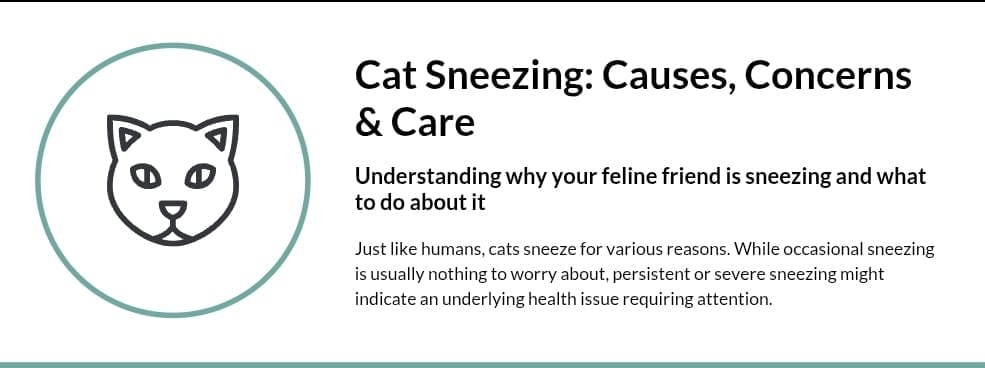
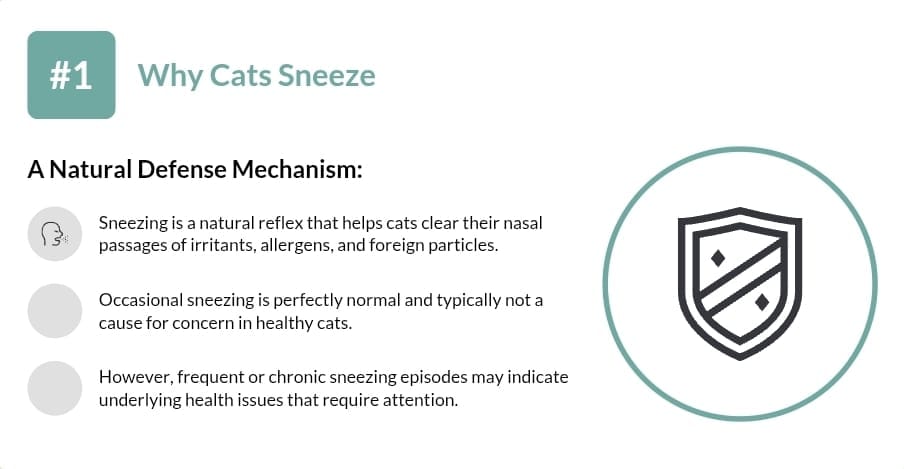
Common Causes of Cat Sneezing
Several factors could be responsible for frequent sneezing in cats.
1-Upper Respiratory Infections (URIs)
Cats often sneeze because of upper respiratory infections (URIs). These infections are common health problems for them. These infections affect the nose, throat, and sinuses, similar to colds in humans. Viruses or bacteria usually cause them and can spread easily among cats. The most common pathogens responsible for feline URIs include Feline Herpesvirus (FHV-1), Feline Calicivirus (FCV), Bordetella bronchiseptica, and Chlamydophila felis. Feline Herpesvirus (FHV-1) and Feline Calicivirus (FCV) are the main causes of upper respiratory infections in cats. They account for about 80% of these infections.
2-Allergies
If your cat sneezes more in certain environments, then allergies could be the cause. Cats may react to various allergens like pollen, dust, mold, scented products, or tobacco smoke.
3-Foreign Objects in the Nose
Cats are naturally curious, and occasionally, small objects can become stuck in their nasal passages, leading to frequent sneezing. Grass and dust are common culprits.
4- Dental Problems
Sometimes, dental infections such as abscesses or gum disease can spread to the nasal passages, leading to sneezing. Bad breath and difficulty eating may accompany this condition.
5- Fungal Infections
Although less common, fungal infections like cryptococcosis can cause persistent sneezing, nasal discharge, and breathing difficulties in cats.
6-Nasal Tumors or Polyps
Nasal tumors or polyps can also cause persistent sneezing, especially in senior cats. They are often accompanied by nasal discharge or bleeding. That’s why a veterinary examination is essential to determine the exact cause and ensure proper treatment.
7-Vaccination Side Effects
Some vaccines, especially those for respiratory infections, may cause mild sneezing for a few days after administration. But it is usually temporary and should not be a cause for concern.
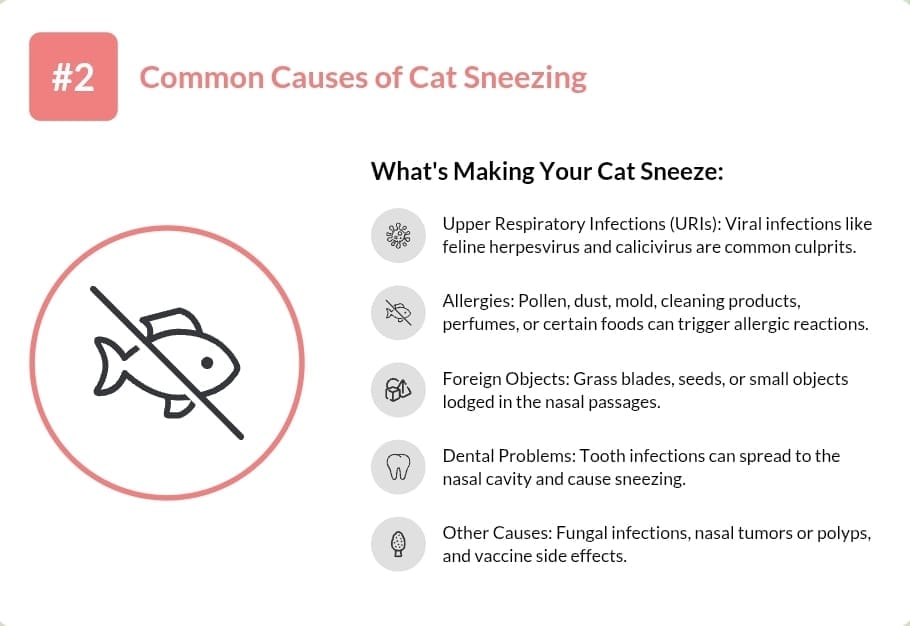
When should you worry about a cat sneezing?
While occasional sneezing in cats is normal, it might indicate a serious issue if it occurs frequently. A cat sneezing a lot indicates an underlying health issue.
If your cat sneezes a lot for more than a few days, it may have an infection or a long-term problem.
Clear discharge is usually harmless. However, yellow, green, or bloody discharge may mean a serious infection, inflammation, or tumors.
Additionally, labored breathing, wheezing, or open-mouth breathing suggests a more severe respiratory issue requiring immediate veterinary care.
Moreover, watch for symptoms like:
- Runny eyes or eye swelling
- Coughing or gagging
- Loss of appetite
- Fever or lethargy
- Ulcers in the mouth or nose
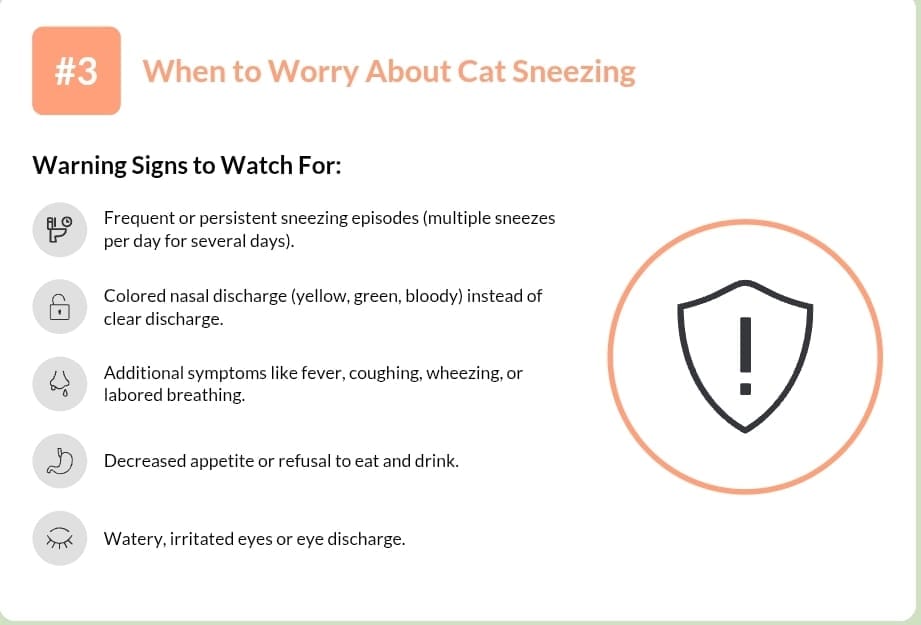
Sneezing and Stress in Cats
When a cat is stressed, its immune system can weaken, making it more prone to infections that might cause sneezing. It contributes to cat sneezing by reactivating latent viruses like feline herpesvirus (FHV-1) in previously infected cats. Moreover, stress lowers cats immunity and makes them susceptible to upper respiratory tract infections.
Stress may also heighten a cat’s reaction to dust, perfumes, or household chemicals, triggering sneezing.
Some common stress triggers for cats may be
- Moving to a new home
- Changes in routine or environment
- Introduction of new pets or family members
- Loud noises or unfamiliar visitors
- Vet visits or travel
Managing stress can help prevent recurring respiratory problems in sensitive cats.
How do you treat a sneezing cat?
The treatment of sneezing in cats is based on a specific cause. These are some of the most frequently used treatment methods:
Supportive Home Care
You can help your cat’s nasal congestion by using a humidifier. You can also let them rest in a warm, steamy bathroom. Keep their nose and eyes clean by gently wiping away discharge with a warm, damp cloth.
Offer strong-smelling wet food to stimulate their appetite and keep them hydrated. Avoid scented candles, air fresheners, cigarette smoke, and dusty cat litter. These can irritate your cat’s breathing.
Medications for Infections
If a bacterial infection is suspected, vets may prescribe antibiotics like amoxicillin or doxycycline. But for viral infections like feline herpesvirus, antivirals such as famciclovir may be recommended. Additionally, in some cases, nasal drops or decongestants can help clear nasal passages.
Allergy Management
First of all, identify and eliminate possible allergens like dust, pollen, or cleaning chemicals. Some cats benefit from antihistamines like cetirizine (Zyrtec), but only under veterinary guidance.
Other Treatment Options
- If a dental infection is causing sneezing, a professional cleaning or tooth extraction may be necessary.
- For fungal infections such as cryptococcosis, antifungal medications like fluconazole are typically required.
- If nasal polyps or tumors are present, surgical removal may be the best treatment option.
Preventing Cat Sneezing
In most cases, a cat sneezing once in a while isn’t a cause for concern. But you should take all possible steps to prevent frequent sneezing in cats. Here are some ways to help prevent persistent sneezing in cats:
- Clean your home often to reduce dust, pollen, and mold. These can irritate your cat’s breathing. Use unscented, low-dust cat litter to reduce nasal irritation. Avoid strong-smelling cleaners, perfumes, scented candles, and smoke.
- Provide a nutritious diet rich in essential vitamins and minerals to strengthen your cat’s immune system. Also, ensure your cat stays hydrated by offering clean water and moisture-rich food.
- Keep vaccinations up to date, especially against feline herpesvirus and calicivirus. Avoid exposing your cat to sick cats, particularly in multi-cat households or shelters.
- Reduce stress triggers such as sudden changes in routine, loud noises, or new pets. Also, make sure your cat has a calm, quiet area where they can rest and feel secure whenever they need a break.
“The best way to prevent sneezing in cats is by providing them with clean air, a stress-free home, and lots of love.”
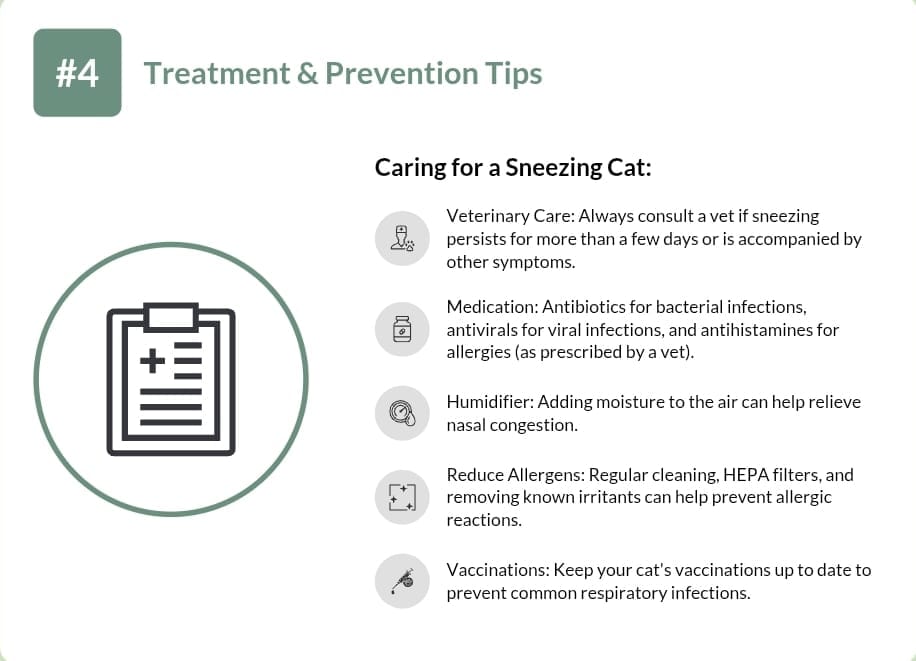
Conclusion
Cat sneezing is completely normal, but you should be vigilant for excessive sneezing in cats. Identifying the cause early can help prevent complications and ensure your cat stays healthy.
If your cat sneezes often and has a runny nose, trouble breathing, or other worrying signs, see a vet. They can give the right diagnosis and treatment.
Caring for your cat’s respiratory health will help them lead a happy and comfortable life. Has your cat experienced frequent sneezing? Share your story or ask any questions in the comments below!
Frequently Asked Questions About Cat Sneezing
1. Why is my cat sneezing all of a sudden?
Answer: Cats can sneeze suddenly for a variety of reasons, including exposure to dust, allergens, or strong smells. If the sneezing is occasional, it’s usually not a cause for concern. However, frequent sneezing may indicate an underlying issue, such as an upper respiratory infection, allergies, or even a foreign object stuck in their nose. It’s important to monitor the frequency and other symptoms.
2. Is sneezing in cats a sign of a cold?
Answer: While cats can get respiratory infections that are similar to a human cold, they do not catch “colds” in the same way. Sneezing can be a symptom of an upper respiratory infection (URI), which is often caused by viruses like Feline Herpesvirus (FHV-1) or Feline Calicivirus (FCV). URIs can cause sneezing along with nasal discharge and eye watering, so it’s essential to consult a vet if symptoms persist.
3. Can allergies cause my cat to sneeze?
Answer: Yes, allergies are a common cause of sneezing in cats. Cats can be allergic to various environmental triggers such as pollen, dust mites, mold, scented cleaning products, or even tobacco smoke. If you suspect allergies, try eliminating potential allergens and monitoring your cat’s behavior. If the sneezing continues, a vet may recommend antihistamines or further testing.
4. What are the signs that my cat’s sneezing is related to a serious illness?
Answer: If your cat’s sneezing is accompanied by signs such as thick, yellow, or green nasal discharge, coughing, difficulty breathing, or a loss of appetite, these could indicate a more serious health issue such as a respiratory infection, a nasal tumor, or a fungal infection. Seek veterinary attention immediately if any of these symptoms occur.
5. How can I prevent my cat from sneezing so much?
Answer: Preventing sneezing in cats involves reducing exposure to irritants like dust, pollen, strong smells, and smoke. Keeping your home clean, using low-dust cat litter, and maintaining a stress-free environment can help. Ensuring your cat is up to date on their vaccinations and providing them with a healthy diet will also support their immune system and reduce the risk of respiratory issues.
Read more: